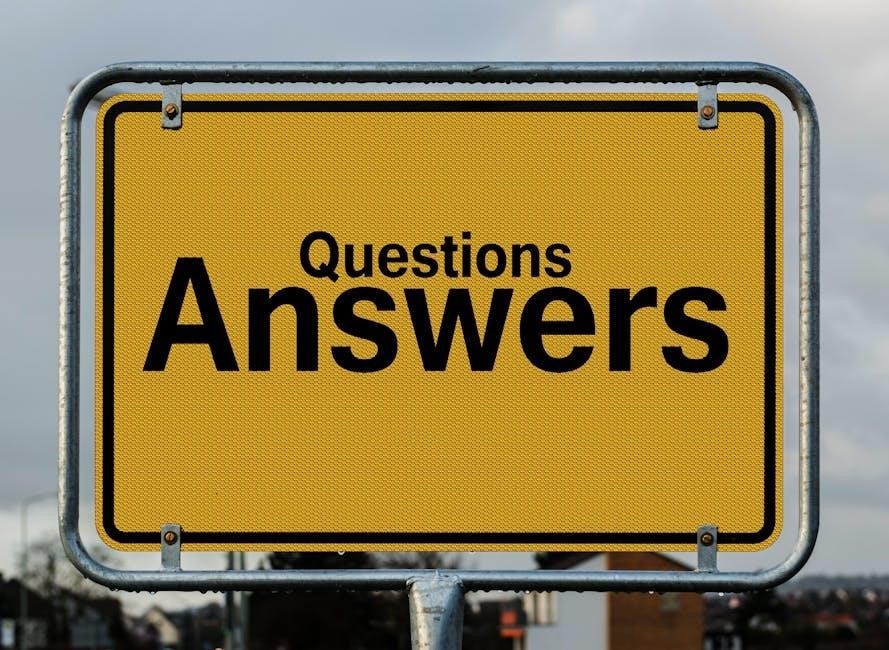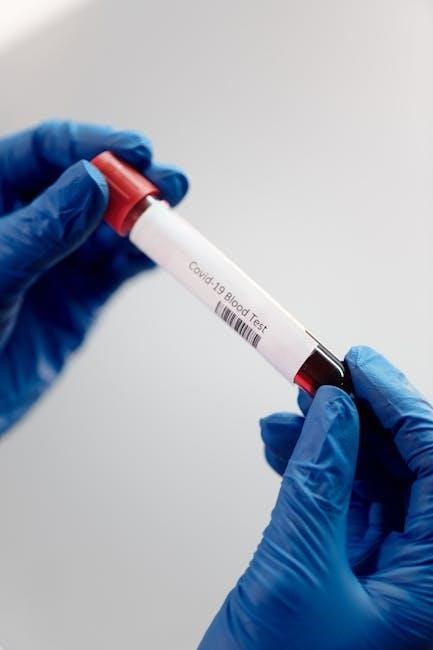Overview of the Pennsylvania Notary Public Exam
The Pennsylvania Notary Public Exam assesses knowledge of notarial acts‚ state laws‚ and ethics. It features multiple-choice questions‚ with study guides and practice tests available for preparation.
Importance of Preparation
Preparation is crucial for success on the Pennsylvania Notary Public Exam. Utilizing study guides‚ practice tests‚ and PDF resources ensures a thorough understanding of notarial laws‚ ethics‚ and procedures. These materials help identify weak areas‚ allowing focused study and improved confidence. Regular practice simulates real exam conditions‚ enhancing time management and familiarity with question formats. Thorough preparation not only builds knowledge but also ensures readiness for the exam’s challenges‚ ultimately increasing the likelihood of passing and becoming a licensed notary public in Pennsylvania.
Structure of the Exam
The Pennsylvania Notary Public Exam consists of multiple-choice questions designed to test knowledge of notarial laws‚ ethics‚ and procedures. The exam includes a set number of questions‚ with a specific time limit for completion. Topics covered range from notarial acts and identification requirements to prohibited practices and legal consequences. The format ensures clarity and uniformity‚ with questions carefully crafted to assess understanding of Pennsylvania-specific notary regulations. The structure is straightforward‚ allowing candidates to navigate the exam efficiently while demonstrating their mastery of the subject matter.

Eligibility Requirements for the Pennsylvania Notary Public Exam
Eligibility for the Pennsylvania Notary Public Exam requires candidates to meet state-mandated criteria‚ including residency and application requirements‚ ensuring they fulfill all necessary legal and ethical standards and other requirements.
Age and Residency Requirements
To qualify for the Pennsylvania Notary Public Exam‚ candidates must be at least 18 years old and either a Pennsylvania resident or employed full-time in the state. Residency is verified through a valid Pennsylvania driver’s license or ID card‚ while employees must provide proof of full-time employment within state borders. Meeting these basic eligibility criteria ensures candidates are legally permitted to sit for the exam and perform notary duties within Pennsylvania.
Background Check and Application Process

To apply for the Pennsylvania Notary Public Exam‚ candidates must submit an application to the Pennsylvania Department of State. A criminal background check is required‚ and applicants must complete a notary public education course approved by the state. Once the application is approved‚ candidates receive their commission‚ valid for four years. The process ensures only qualified individuals become notaries‚ maintaining integrity and accountability in the role.

Key Topics Covered in the PA Notary Public Exam
The exam covers notarial acts‚ Pennsylvania-specific laws‚ identification requirements‚ and prohibited practices‚ ensuring notaries understand their duties‚ legal obligations‚ and ethical responsibilities accurately.
Notarial Acts and Procedures
The exam thoroughly tests knowledge of various notarial acts‚ such as acknowledgments‚ oaths‚ affirmations‚ and jurats. It also covers proper procedures for executing these acts‚ including verifying identity‚ completing certificates‚ and maintaining accurate records. Understanding the legal implications and proper execution of each act is critical. The test questions ensure candidates can differentiate between acceptable and prohibited practices‚ emphasizing attention to detail and adherence to Pennsylvania-specific regulations. Mastery of these procedures is essential for performing notarial duties competently and ethically.
Pennsylvania Notary Laws and Ethics
The exam emphasizes Pennsylvania-specific notary laws and ethical standards to ensure compliance. Questions focus on impartiality‚ avoiding conflicts of interest‚ and adherence to state statutes. Ethical dilemmas‚ such as refusing service to unqualified individuals‚ are tested. Understanding legal boundaries and consequences of misconduct‚ like fines or commission revocation‚ is crucial. The section highlights the importance of maintaining confidentiality and upholding public trust‚ reflecting the notary’s role as a public official. This ensures ethical conduct in all notarial interactions.
Identification Requirements for Signers
The exam tests knowledge of proper identification requirements for signers. Pennsylvania law mandates that notaries verify the identity of individuals through credible‚ government-issued photo IDs. Acceptable forms include driver’s licenses‚ passports‚ and state ID cards‚ which must be valid and not expired for more than three years. The notary must ensure the signer’s physical presence and confirm the ID matches the signature. Failure to comply can result in invalid notarizations and legal consequences‚ emphasizing the importance of strict adherence to these protocols.
Prohibited Practices and Legal Consequences
The exam assesses knowledge of prohibited notarial practices and their legal implications. Pennsylvania notaries must avoid conflicts of interest‚ unauthorized legal advice‚ and falsifying documents. Performing a notarization without proper identification or for someone mentally incapable is prohibited. Violations can lead to fines‚ commission revocation‚ or criminal charges. Understanding these restrictions is crucial to upholding ethical standards and avoiding legal repercussions‚ ensuring the integrity of notarial acts in the state of Pennsylvania.

Exam Format and Question Types

The Pennsylvania Notary Public Exam is a multiple-choice test with a set time limit. Questions focus on legal definitions‚ scenarios‚ and ethical considerations.
Multiple-Choice Questions and Answer Format
The Pennsylvania Notary Public Exam features multiple-choice questions‚ each with four possible answers. Candidates must select the correct response based on their knowledge of notarial acts‚ state laws‚ and ethical practices. The format ensures clarity and fairness‚ allowing examinees to demonstrate their understanding of key concepts. Practicing with sample questions from study guides or PDF resources helps familiarize test-takers with the structure and content‚ improving their ability to respond accurately and confidently during the actual exam.
Time Limit and Passing Score
The Pennsylvania Notary Public Exam has a time limit of 60 minutes to complete 30 multiple-choice questions. Candidates must score at least 80% to pass‚ meaning they need to answer correctly at least 24 out of 30 questions. Proper time management is crucial‚ as the exam assesses both knowledge and the ability to work efficiently. Practicing with timed practice tests from PDF resources can help build stamina and ensure readiness for the exam’s time constraints.
Prohibited Items During the Exam
During the Pennsylvania Notary Public Exam‚ candidates are prohibited from bringing electronic devices‚ such as smartphones‚ tablets‚ or calculators‚ into the testing area. Personal items like wallets‚ watches‚ and bags must be stored securely outside the exam room. No food‚ beverages‚ or writing materials are allowed unless authorized. Violating these rules may result in disqualification. Ensure compliance by reviewing the list of prohibited items provided in the exam instructions or study materials.

Recommended Study Materials
Utilize official PA Notary Public study guides‚ practice tests‚ and online courses to ensure comprehensive preparation for the exam.
PA Notary Public Study Guides and Manuals
PA Notary Public study guides and manuals are essential resources for exam preparation. They provide detailed explanations of notarial duties‚ state laws‚ and ethical practices. These guides often include sample questions‚ practical exercises‚ and real-world scenarios to enhance understanding. Official materials from the Pennsylvania Department of State or approved providers are highly recommended. They ensure accuracy and relevance‚ covering topics like notarization procedures‚ identification requirements‚ and prohibited practices. Using these resources helps candidates master the subject matter efficiently.
Practice Tests and Question Banks
Practice tests and question banks are invaluable for familiarizing oneself with the exam format. They simulate real test conditions‚ helping candidates assess their readiness. These resources typically include a variety of multiple-choice questions‚ covering topics like notarial acts‚ PA laws‚ and ethical practices. Detailed explanations for correct and incorrect answers enhance learning. Regularly using these tools improves problem-solving skills‚ time management‚ and confidence. They are a must for identifying and addressing weak areas before the actual exam.
Online Courses and Tutorials
Online courses and tutorials provide structured learning experiences tailored to the Pennsylvania Notary Public Exam. They often include video lessons‚ interactive modules‚ and downloadable materials. These resources cover essential topics like notarial procedures‚ state laws‚ and ethical practices. Many courses offer flexibility‚ allowing candidates to study at their own pace. They also include access to expert instructors for clarification on complex topics. Completing these courses ensures a comprehensive understanding of the exam material and boosts readiness for the test.

Benefits of Using Practice Tests
Practice tests familiarize candidates with the exam format‚ improve time management‚ and identify weak areas. They boost confidence and readiness for the actual Pennsylvania Notary Public Exam.
Understanding the Exam Pattern
Practice tests provide a clear understanding of the Pennsylvania Notary Public Exam’s structure‚ including question types‚ formats‚ and content distribution. They mirror the actual test‚ allowing candidates to familiarize themselves with the layout and timing. By simulating real conditions‚ practice tests reveal the emphasis on key topics like notarial acts‚ ethics‚ and state-specific laws. This exposure helps candidates anticipate and prepare for the types of questions they will encounter‚ ensuring a smoother experience during the actual exam.
Identifying Weak Areas
Practice tests help candidates pinpoint areas where they need improvement by highlighting incorrect answers and misunderstood concepts. Reviewing the ‘PA Notary Public Test Questions and Answers PDF’ provides clarity on mistakes‚ allowing for targeted study. This focused approach strengthens knowledge in challenging sections‚ ensuring better preparedness for the actual exam and improving overall performance.
Building Confidence and Time Management Skills
Regularly practicing with the ‘PA Notary Public Test Questions and Answers PDF’ enhances confidence by familiarizing candidates with the exam format and content. Time management skills improve as individuals learn to allocate seconds per question‚ ensuring they complete the test within the allotted time. This practice fosters a calm and composed mindset‚ reducing exam-day anxiety and improving overall performance.

How to Effectively Use PDF Resources
Utilize the ‘PA Notary Public Test Questions and Answers PDF’ by annotating key points‚ searching for specific topics‚ and organizing materials for efficient study sessions.
Downloading and Organizing Study Materials
Download the ‘PA Notary Public Test Questions and Answers PDF’ from trusted sources. Create dedicated folders on your device for easy access. Organize materials by topics‚ such as notarial acts or ethics‚ to streamline your study sessions. Use bookmarks or tabs to quickly navigate through sections. Regularly update your files to ensure you have the latest version. This systematic approach helps in efficient preparation and reduces study time.
Reviewing Answers and Explanations
After completing practice tests‚ thoroughly review the answers and explanations provided in the ‘PA Notary Public Test Questions and Answers PDF.’ Focus on understanding the rationale behind correct answers and identifying common mistakes. Pay attention to explanations of complex topics‚ such as notarial laws or ethical dilemmas. This step ensures comprehension and helps reinforce learning. Regular review strengthens memory and improves problem-solving skills‚ reducing errors in future attempts.
Simulating Real Exam Conditions
Simulate real exam conditions by setting a timer and using the ‘PA Notary Public Test Questions and Answers PDF’ to practice under timed constraints; Mimic the actual test environment to build familiarity and reduce anxiety. Focus on answering questions within the allotted time‚ just as you would during the real exam. This practice helps refine time management and ensures readiness for the actual test format‚ improving overall performance and confidence.

Common Mistakes to Avoid
- Ignoring key details in questions can lead to incorrect answers and wasted time.
- Poor time management may result in incomplete sections and missed opportunities.
- Overlooking ethical considerations can lead to legal consequences and exam failure.
Ignoring Key Details in Questions
Ignoring key details in questions is a common mistake that can lead to incorrect answers. PA notary public test questions often include specific scenarios or legal nuances that require careful reading. Rushing through questions or skipping over complex terms can result in misunderstandings. It’s essential to take the time to thoroughly read and analyze each question‚ ensuring all details are considered before selecting an answer. Practicing with sample questions can help improve attention to detail and reduce errors.
Not Managing Time Effectively
Not managing time effectively can significantly impact exam performance. The PA Notary Public Exam consists of multiple questions‚ and without proper time allocation‚ candidates may rush or leave questions unanswered. Practice tests help improve pacing and ensure all sections are completed within the allotted time. Skimming through questions and prioritizing easier ones first can maximize efficiency. Poor time management often leads to incomplete answers or hasty guesses‚ which can lower the overall score. Developing a timed strategy during preparation is crucial for success.
Overlooking Ethical Considerations
Overlooking ethical considerations is a common mistake in the PA Notary Public Exam‚ as notary practices heavily rely on adherence to legal and moral standards. Candidates often underestimate the importance of ethical dilemmas in exam questions‚ leading to incorrect answers. Familiarizing oneself with Pennsylvania’s notary laws and ethical guidelines is vital. Ignoring conflicts of interest‚ impartiality‚ and confidentiality can result in severe consequences‚ both legally and professionally. Ethical awareness ensures compliance and upholds public trust in notary services.
Final Tips for Success
Stay calm‚ manage your time wisely‚ and thoroughly review state-specific laws. Organize your study materials‚ practice consistently‚ and seek additional resources if needed to ensure understanding.
Staying Calm and Focused
To stay calm and focused during the exam‚ practice deep breathing exercises and maintain a positive mindset. Review the PA Notary Public Test Questions and Answers PDF thoroughly to build confidence. Familiarize yourself with the exam format and time limits to avoid last-minute anxiety. Prioritize understanding key concepts over memorization‚ and ensure you read each question carefully before answering. Managing your nerves effectively will help you approach the exam with clarity and precision.
Reviewing State-Specific Laws
Reviewing Pennsylvania-specific notary laws is crucial for success. The PA Notary Public Test Questions and Answers PDF highlights state-specific regulations‚ such as requirements for witness signatures‚ acceptable forms of identification‚ and prohibitions on notarizing documents for family members. Familiarize yourself with the Pennsylvania Notary Public Law and ethical standards to ensure compliance. Regularly reviewing these laws will help you confidently answer exam questions and perform your duties correctly as a notary public in Pennsylvania.
Seeking Additional Resources if Needed
Supplementing your study with additional resources can enhance your preparation. Beyond the PA Notary Public Test Questions and Answers PDF‚ consider exploring state-approved notary handbooks‚ online tutorials‚ or attending workshops. These resources provide in-depth insights into Pennsylvania-specific laws and procedures. Additionally‚ the Pennsylvania Department of State offers legal resources and updates. If you find certain topics challenging‚ seeking guidance from notary experts or instructors can clarify doubts and strengthen your understanding‚ ensuring you’re well-prepared for the exam.
Thorough preparation is key to passing the Pennsylvania Notary Public Exam. The PA Notary Public Test Questions and Answers PDF is a valuable resource for success. Stay informed and prepared for your role as a Notary Public.
Importance of Thorough Preparation
Thorough preparation is essential for mastering the Pennsylvania Notary Public Exam. Using resources like the PA Notary Public Test Questions and Answers PDF ensures familiarity with exam content. It helps identify weak areas‚ improves time management‚ and builds confidence. Regular review of state-specific laws and notarial procedures is critical. A well-prepared candidate is more likely to perform well and understand ethical responsibilities. Consistent study with reliable materials guarantees readiness for the exam and future duties as a Notary Public.
Next Steps After Passing the Exam
After passing the Pennsylvania Notary Public Exam‚ candidates must complete the commission process. This includes submitting the required application‚ paying fees‚ and obtaining a notary stamp and journal. The state will issue a commission certificate‚ authorizing you to perform notarial acts. It’s crucial to maintain proper records and adhere to state laws. Using resources like the PA Notary Public Test Questions and Answers PDF ensures continued understanding of duties and ethical practices. Stay updated on legal changes to uphold professionalism and compliance.



